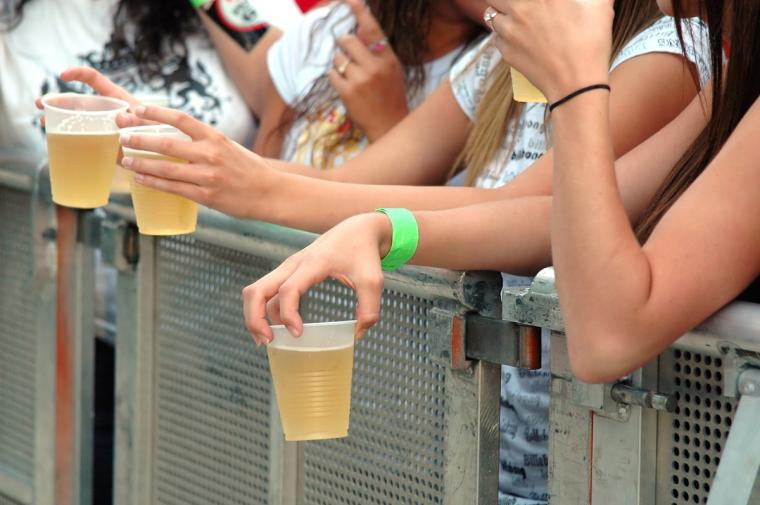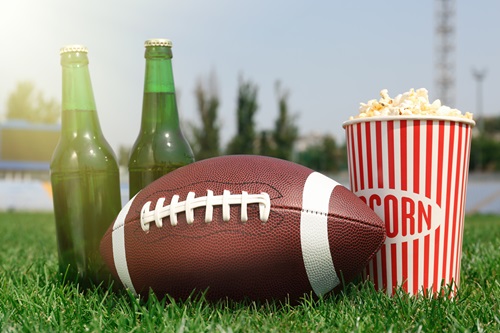
Big-time college football is going through some major changes, from conference realignment to broadcast deals. And according to a recent Associated Press survey, alcohol is flowing in more stadiums than ever.
“For many years, the booze flowed only outside of stadiums. Not anymore: Selling beer and wine inside college football stadiums has become the norm over the past decade, a way for schools to bring in more revenue and attract fans who might otherwise be inclined to stay home,” the AP reported, noting that in its survey of Power Five conference schools (plus Notre Dame), “55 of 69 of them — 80% — now sell alcohol in the public areas of their stadiums on game days. Of the remaining schools, some sell alcoholic drinks in non-public areas of the venue such as suites; others do not sell booze at all.”
The survey also revealed that “19 schools that currently are in Power Five conferences began selling alcohol to the public during football games in 2019. Before that, just 20 such schools permitted the practice.”
What’s more, USA Today noted in its college football primer back in September, that “[o]f the 133 FBS [Football Bowl Subdivision] schools in 2023, 117 (88%) will sell alcohol this upcoming season. Three schools — Kentucky, Michigan State and Western Michigan — will be selling alcohol for the first time this season. College football has seen a boom in alcohol sales in recent years, with the biggest jump occurring in 2019. Since the 2019 football season, 56 FBS schools have started selling alcohol. This applies to when alcohol was made available stadium-wide and not just in premium locations.”
According to the newspaper, 16 schools were not planning to sell alcohol during the 2023 season — including, perhaps surprisingly, two Big 10 powerhouses in the University of Michigan and the University of Wisconsin. Both, however, recently started selling booze at basketball and hockey games.
“If our fan experience metrics increase, then it certainly warrants a conversation,” Mitchell Pinta, Wisconsin’s deputy athletic director, told the AP about introducing alcohol sales at Camp Randall Stadium.
University of Michigan officials are taking a similar wait-and-see approach.
 “We have to take slow steps in order to implement this, because it hasn’t been a part of our culture,” athletic director Warde Manuel told the AP. “This is a way to phase that in, see what the data says and then talk to the regents and the president again.”
“We have to take slow steps in order to implement this, because it hasn’t been a part of our culture,” athletic director Warde Manuel told the AP. “This is a way to phase that in, see what the data says and then talk to the regents and the president again.”
“One of the things that makes us unique is a collegiate atmosphere,” University of Michigan Regent Paul Brown said in October. “It is different than the pro sports that always serve alcohol. I think that difference is one thing that creates value for our institution. And so, I don’t want to destroy that value.”
While that’s commendable, it’s clearly a minority viewpoint these days. According to the AP:
Alcohol has been sold in football stadiums in various ways for years, but the number of schools willing to do it picked up dramatically in the late 2010s. Adam Barry, a health behavior social scientist at Texas A&M, said after the Southeastern Conference allowed schools to sell alcohol in 2019, booze started to flow in stadiums from coast to coast.
“Since the SEC made that decision, other Power Five conferences followed suit, and we’ve seen an exponential rise,” Barry said.
Since 2019, another 16 schools have come on board. … Michigan Gov. Gretchen Whitmer signed legislation in July lifting the state’s ban on alcohol being sold at college sporting events. Michigan State made moves relatively quickly in response.
“I didn’t have much trepidation because we’re not the first,” said Marlon Lynch, Michigan State’s chief safety officer. “It’s been done for years.”
Researchers at the University of Iowa earlier this year published a study in the Western Journal of Emergency Medicine that attempted to “determine the impact of in-stadium alcohol sales on the incidence of alcohol-related emergency department (ED) visits and local emergency medical services (EMS) calls” at the university’s Kinnick Stadium, which began selling alcohol to spectators during the 2021 season.
“We hypothesized that the availability of alcohol throughout the stadium would lead to an increase in alcohol-related patient presentations,” they wrote. “This was a retrospective study including patients who used local EMS and presented to the ED on football Saturdays in the 2019 and 2021 seasons.”
What they found out — and the potential reasons for those results — could help guide college and university stadium operations when it comes to serving alcohol on game days.
“There was a decrease in alcohol-related EMS calls on home game days in 2021, although the result was not statistically significant,” researchers concluded. “In-stadium alcohol sales had no significant impact on the frequency or proportion of alcohol-related ED visits. The reason for this outcome is unclear, but it is possible that fans drank less at tailgate parties knowing they could consume more once the game started. Long lines and a two-beverage limit at stadium concessions may have kept patrons from consuming excessively. The results of this study may inform similar institutions regarding the safe implementation of alcohol sales during mass-gathering events.”

